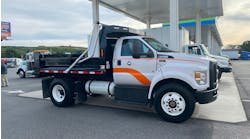This article originally appeared on FleetOwner.com.
This month, Tim Kraus concluded his nearly 17-year tenure leading the Heavy Duty Manufacturers Association (HDMA), first as executive director and since 2008, as president and chief operating officer. David Giroux, who has served in executive roles at several truck manufacturers and tier-1 suppliers, has assumed his place.
Under Kraus’ watch, the commercial vehicle division of the Motor & Equipment Manufacturers Association (MEMA) quintupled its revenue as well as membership, from 40 in 2004 to around 200 now. The expert marketer and experienced supplier advocate also helped launch the Heavy Duty Aftermarket Week (HDAW) event, which attracted 2,500 attendees, including more than 700 distributors, to the last live event in January 2020. The first HDAW in 2006 garnered 1,200 supplier attendees and 350 distributors.
The strategy for such growth was simple. Kraus emphasized the importance of relationships in the industry, a value he learned early in life and practiced at home through family dinners with his wife and children when he wasn’t traveling — which was often — and on the job lobbying for small parts suppliers’ and fleet customers’ voices and concerns to be heard by OEMs and the government.
This made him a popular figure across the CV industry, sometimes almost too popular. He lamented how irritating it must have been for his staff to walk along-side him at HDAW or other events like the Technology & Maintenance Council meeting because he would always stop and chat with someone.
“They said I can go 50 feet an hour,” Kraus quipped. “It isn’t because I made a real effort to get to know everybody; it’s just that I’ve been around for so long and I’ve interacted with almost everybody — and I genuinely like people.”
Kraus’ work life spans more than 50 years and included a stint in the U.S. Marine Corps (USMC) and roles in large and small vehicle parts manufacturers. Although he’s gearing up for retirement, he made certain to note he’s “not ready for the barn” yet. He’ll still be roaming industry events when they return, continue as a consultant, and sit on some boards while making time to travel and try out saltwater fishing.
With the HDMA chapter at a close, FleetOwner thought it was the perfect time to reflect with the industry leader by conducting an exit interview.
FleetOwner: What was your first experience in the transportation sector that paved the way to where you are now?
Tim Kraus: My first real full-time job [after the USMC] was in my early 20s. I owned two Texaco gas stations in the Minneapolis-St. Paul area, with two service bays in one and three in the other.
The worst thing in the world for me was when it was 20 below zero and one of my customer’s cars wouldn’t start. It was my fault as far as I was concerned because I didn’t have them prepared for the winter adequately.
Then, of course, the Arab oil embargo happened, and I did manage to weather that, but someone came along and offered to buy the business for a huge profit over what I had into it.
FO: Then where did you go?
TK: I became a brake and friction distributor salesman and treated them the same way I believe in taking care of customers, developing a real close relationship with all of them. Then, because I grew up as a gearhead, I went to work at McCord Gaskets in 1976 as a district sales manager.
In 1983, I joined Phillips & Temro Industries, a company in Minneapolis that makes cold weather starting products, as national sales manager. Reliability was always extraordinarily important. Company culture demanded products had to be absolute top quality with as close to zero defects as you could get. It wasn’t necessarily a target; it was just understood that you do everything possible to make sure that everything you delivered was exactly what the customers expected. Phillips & Temro was a very early adopter of Kaizen, the Japanese manufacturing philosophy of putting quality and process improvements in the hands of the people. The company had as many process engineers as design engineers and achieved a 50-parts-per-million failure rate.
FO: When you were tapped to lead HDMA, what were some of your initial goals?
TK: I had a long list, because I had been on the board of HDMA and was chairman from 2001-2002. One was more active engagement in government affairs. The industry was facing the biggest engineering project it had ever taken on to meet the EPA requirements for 2004, 2007, and 2010. This required complete redesigns of most of the engines and complete retraining of all the people that would be expected to service those vehicles once they were on the road, times three.
Probably one of the more frustrating things was that the suppliers didn’t have a voice on how that stuff was taking place. It would have probably been a lot more beneficial earlier on if the supplier community had banded together with the truck manufacturers and the American Trucking Associations. The Department of Transportation also wanted to reduce the stopping distance on heavy trucks. The councils of all the brake manufacturers were all up in arms about it. We engaged our Washington office to stall that out a little bit. That stopping distance regulation took nine years to be put in place. And it was with the understanding that not all trucks are the same. If you want a truck to stop in 250 feet, we can do that. It’s just the trailer part that’s the problem. It will go over the top of the truck. The brake manufacturers were finally able to do that with air disc brakes, brake compounding, and wider brake shoes and brake drums.
Pretty much every other component on the truck, except for the sheet metal and the frame, are designed by the suppliers, so they should have a say in what’s happening with safety requirements [and] with emissions requirements.
FO: A lot of your career was built around relationships. What do you think about them now?
TK: Relationships are still important — even though there are a lot of concerns within the industry, maybe some of it on the big customer side, where they don’t want relationships to be so important. You may see a plant in Rockford, Illinois, making something, and they find they can buy it for 50 cents cheaper in China. And they offshore and put 200 people out of work.
That’s not happening as often because of quality requirements, but the relationship selling that existed when I began my career doesn’t anymore. OE salespeople on the truck side knew every OEM engineer and purchasing person at the truck manufacturers and could share really great ideas. And six weeks later, they’d have a purchase order, but it was only because they trusted him. They knew the people, the company, and all the things that they were doing.
Trucking companies might have to pay a little bit more than if they did a global quote, but they knew their order would be delivered on time and defect-free. That’s kind of gone by the wayside over the last 15-20 years.
FO: What was the reason behind HDAW?
TK: It was in the interests of trying to do whatever we could to preserve the independent heavy duty aftermarket, the “Bob’s Truck Parts”-type places, because they were taking the squeeze from the dealer programs. We brought together 10 or 11 different organizations that represented different types of independent distributors and independent shop owners and formed a joint operating committee for HDAW. The idea behind it was that they would be able to see the latest products and understand the latest technologies all in one place rather than doing 15 or 16 national meetings.
Recently, we’ve had programs for five or six years in a row on how to improve their ecommerce, bringing in e-tailers like FindIt-Parts, which was a brick and mortar 15 years ago and then got into the online parts business. It’s not all that difficult to get a couple of college kids to put together a website or work with a web services company on a portal. The ones that don’t are around a whole bunch of people that do and spend a lot of time networking and talking to find out what they are doing and then go home and try to figure it out.
FO: Can you share some thoughts on your successor David Giroux and what he will face?
TK: MEMA needed somebody with a background like mine and strong familiarity with and full understanding of the industry. Dave has been with Ford, Meritor, Paccar, Navistar, and Daimler Trucks twice. He really understands the heavy duty business and understands that on a different plane than I do because he’s coming from the original equipment side. He’s got probably a more specific understanding of some of the new stuff that’s coming around because that’s where he’s been focused for the last few years.
He’s got the advantage as he’s been involved in the forefront of all the new technology that’s coming out with vehicle automation and electrification. He even helped turn the Hoover Dam into the largest drive-in movie theater to premiere a video of the autonomous Freightliner Inspiration truck.
He’s a real forward-thinking guy, and I think it’s a huge thing for HDMA to have somebody like him, where he is so well-versed on what the future looks like. His primary challenge right out of the chute is going to be to make sure that the industry understands how imminent the changes are.





